九年级英语第十单元知识点复习
新目标英语九年级Unit_10知识要点归纳
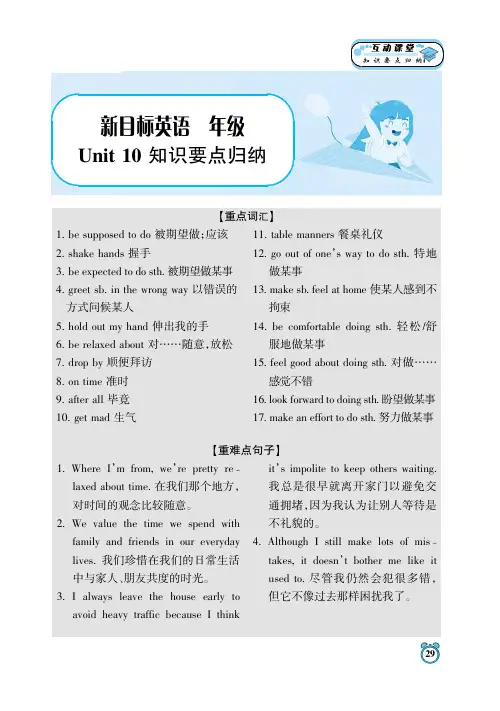
栏注纳【重点词汇】【重难点句子】1.be supposed to do 被期望做;应该2.shake hands 握手3.be expected to do sth.被期望做某事4.greet sb.in the wrong way 以错误的方式问候某人5.hold out my hand 伸出我的手6.be relaxed about 对……随意,放松7.drop by 顺便拜访8.on time 准时9.after all 毕竟10.get mad 生气11.table manners 餐桌礼仪12.go out of one ’s way to do sth.特地做某事13.make sb.feel at home 使某人感到不拘束14.be comfortable doing sth.轻松/舒服地做某事15.feel good about doing sth.对做……感觉不错16.look forward to doing sth.盼望做某事17.make an effort to do sth.努力做某事1.Where I ’m from,we ’re pretty re -laxed about time.在我们那个地方,对时间的观念比较随意。
2.We value the time we spend with family and friends in our everyday lives.我们珍惜在我们的日常生活中与家人、朋友共度的时光。
3.I always leave the house early toavoid heavy traffic because I thinkit ’s impolite to keep others waiting.我总是很早就离开家门以避免交通拥堵,因为我认为让别人等待是不礼貌的。
4.Although I still make lots of mis -takes,it doesn ’t bother me like it used to.尽管我仍然会犯很多错,但它不像过去那样困扰我了。
人教版九年级英语第十单元知识点
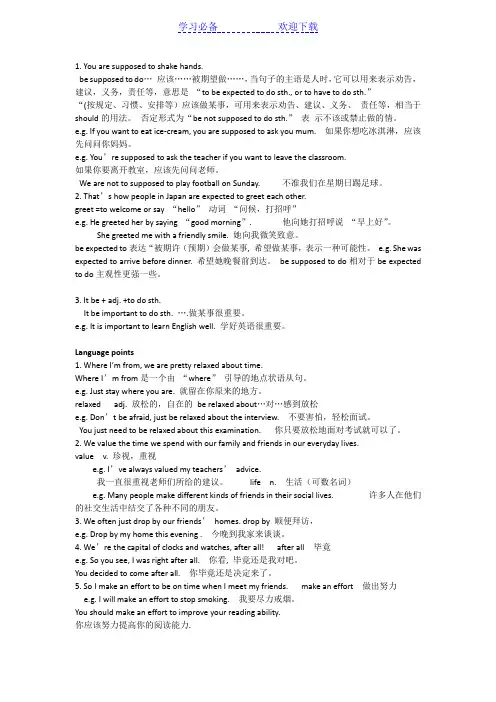
1. You are supposed to shake hands.be supposed to do…应该……被期望做……,当句子的主语是人时,它可以用来表示劝告,建议,义务,责任等,意思是“to be expected to do sth., or to have to do sth.”“(按规定、习惯、安排等)应该做某事,可用来表示劝告、建议、义务、责任等,相当于should的用法。
否定形式为“be not supposed to do sth.”表示不该或禁止做的情。
e.g. If you want to eat ice-cream, you are supposed to ask you mum. 如果你想吃冰淇淋,应该先问问你妈妈。
e.g. You’re supposed to ask the teacher if you want to leave the classroom.如果你要离开教室,应该先问问老师。
We are not to supposed to play football on Sunday. 不准我们在星期日踢足球。
2. That’s how people in Japan are expected to greet each other.greet =to welcome or say “hello”动词“问候,打招呼”e.g. He greeted her by saying “good morning”. 他向她打招呼说“早上好”。
She greeted me with a friendly smile. 她向我微笑致意。
be expected to表达“被期许(预期)会做某事, 希望做某事,表示一种可能性。
e.g. She was expected to arrive before dinner. 希望她晚餐前到达。
be supposed to do相对于be expected to do主观性更强一些。
人教版九年级英语第十单元知识点总结(推荐文档).doc
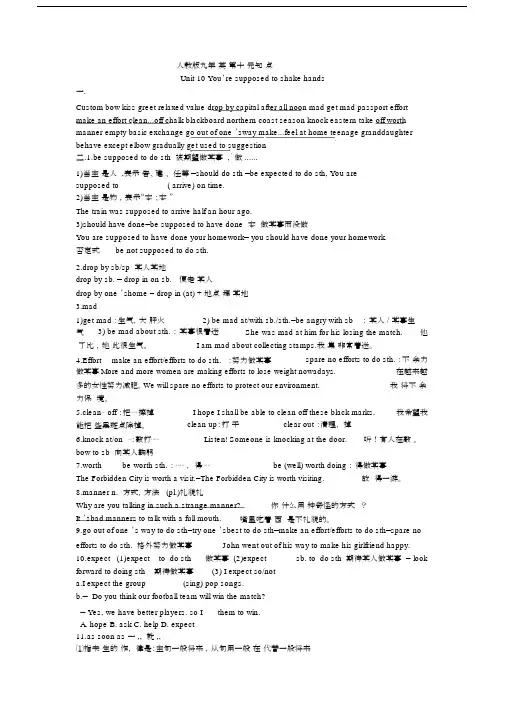
人教版九年英第十元知点Unit 10 You’re supposed to shake hands一.Custom bow kiss greet relaxed value drop by capital after all noon mad get mad passport effort make an effort clean...off chalk blackboard northern coast season knock eastern take off worth manner empty basic exchange go out of one ’sway make...feel at home teenage granddaughter behave except elbow gradually get used to suggestion二.1.be supposed to do sth 被期望做某事 ,做 ......1)当主是人 ,表示告、建、任等 =should do sth =be expected to do sth, You aresupposed to___________( arrive) on time.2)当主是物,表示“本;本”The train was supposed to arrive half an hour ago.3)should have done=be supposed to have done 本做某事而没做You are supposed to have done your homework= you should have done your homework.否定式be not supposed to do sth.2.drop by sb/sp 某人某地drop by sb. = drop in on sb. 便走某人drop by one ’shome = drop in (at) + 地点拜某地3.mad1)get mad :生气,大肝火2) be mad at/with sb./sth.=be angry with sb :某人 / 某事生气3) be mad about sth. :某事很着迷She was mad at him for his losing the match. 他了比,她此很生气。
Unit10九年级知识点
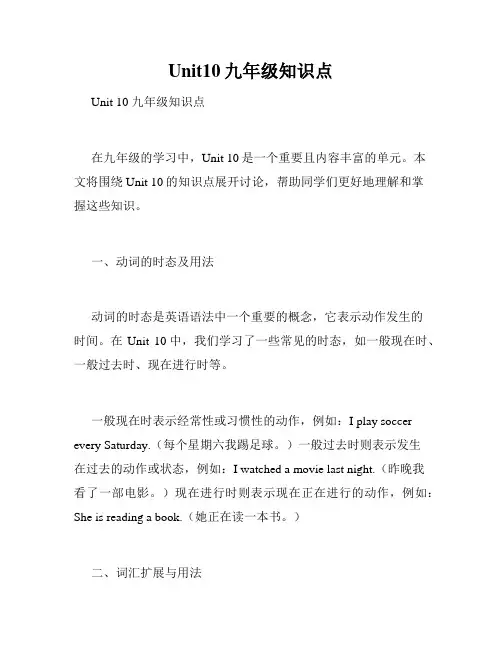
Unit10九年级知识点Unit 10 九年级知识点在九年级的学习中,Unit 10是一个重要且内容丰富的单元。
本文将围绕Unit 10的知识点展开讨论,帮助同学们更好地理解和掌握这些知识。
一、动词的时态及用法动词的时态是英语语法中一个重要的概念,它表示动作发生的时间。
在Unit 10中,我们学习了一些常见的时态,如一般现在时、一般过去时、现在进行时等。
一般现在时表示经常性或习惯性的动作,例如:I play soccer every Saturday.(每个星期六我踢足球。
)一般过去时则表示发生在过去的动作或状态,例如:I watched a movie last night.(昨晚我看了一部电影。
)现在进行时则表示现在正在进行的动作,例如:She is reading a book.(她正在读一本书。
)二、词汇扩展与用法扩充词汇量对于提高英语表达能力非常重要。
Unit 10中,我们学习了一些与旅行相关的词汇,如passport(护照)、destination (目的地)、tourist(游客)等。
掌握这些词汇不仅可以帮助我们更好地理解和阅读英语材料,还能够使我们在旅行中更加流利地交流。
此外,我们还学习了一些常用的短语和表达方式,如keep in touch(保持联系)、have a good time(玩得开心)等。
这些短语和表达方式可以在日常生活和交流中派上用场。
三、被动语态的构成及用法被动语态是英语中的一个重要句式,它用于强调动作的接受者而不是执行者。
在Unit 10中,我们学习了被动语态的构成及用法。
被动语态的构成通常由助动词be加上动词的过去分词形式而成,例如:The book was written by Mark Twain.(这本书是马克·吐温写的。
)被动语态常用于句子中缺少执行者的情况,或者强调动作的接受者的重要性。
四、连词的使用连词在英语中连接或者分割句子,使语言更加流畅。
()人教版九年级英语第十单元知识点复习,文档
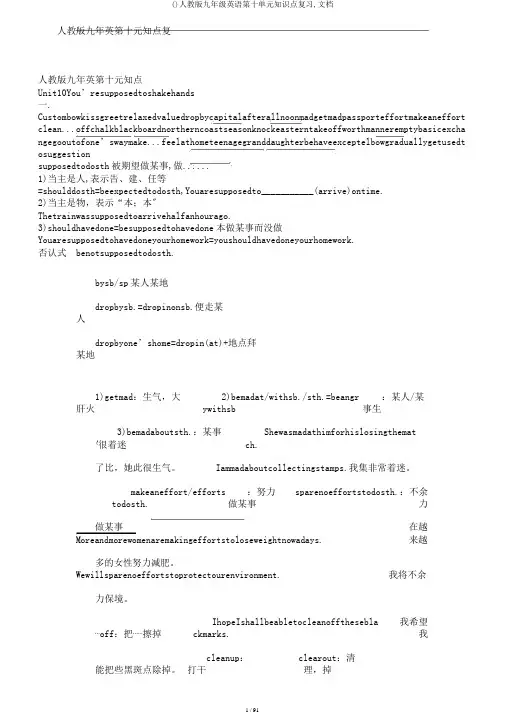
人教版九年英第十元知点复人教版九年英第十元知点Unit10You’resupposedtoshakehands一. Custombowkissgreetrelaxedvaluedropbycapitalafterallnoonmadgetmadpassporteffortmakeaneffort clean...offchalkblackboardnortherncoastseasonknockeasterntakeoffworthmanneremptybasicexcha ngegooutof one’swaymake...feelathometeenagegranddaughterbehaveexceptelbowgraduallygetusedt osuggestionsupposedtodosth被期望做某事,做......1)当主是人,表示告、建、任等=shoulddosth=beexpectedtodosth,Youaresupposedto___________(arrive)ontime.2)当主是物,表示“本;本〞Thetrainwassupposedtoarrivehalfanhourago.3)shouldhavedone=besupposedtohavedone本做某事而没做Youaresupposedtohavedoneyourhomework=youshouldhavedoneyourhomework.否认式benotsupposedtodosth.bysb/sp某人某地dropbysb.=dropinonsb.便走某人dropbyone’shome=dropin(at)+地点拜某地1)getmad:生气,大肝火2)bemadat/withsb./sth.=beangrywithsb:某人/某事生气3)bemadaboutsth.:某事很着迷Shewasmadathimforhislosingthematch.他了比,她此很生气。
人教版九年级上册英语unit10知识点
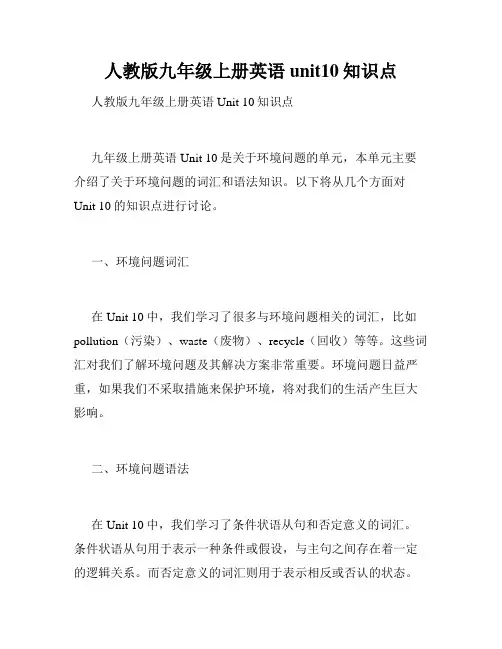
人教版九年级上册英语unit10知识点人教版九年级上册英语Unit 10知识点九年级上册英语Unit 10是关于环境问题的单元,本单元主要介绍了关于环境问题的词汇和语法知识。
以下将从几个方面对Unit 10的知识点进行讨论。
一、环境问题词汇在Unit 10中,我们学习了很多与环境问题相关的词汇,比如pollution(污染)、waste(废物)、recycle(回收)等等。
这些词汇对我们了解环境问题及其解决方案非常重要。
环境问题日益严重,如果我们不采取措施来保护环境,将对我们的生活产生巨大影响。
二、环境问题语法在Unit 10中,我们学习了条件状语从句和否定意义的词汇。
条件状语从句用于表示一种条件或假设,与主句之间存在着一定的逻辑关系。
而否定意义的词汇则用于表示相反或否认的状态。
在表达环境问题或给出建议时,我们可以运用这些语法结构使句子更加丰富多样。
三、环境问题解决方案Unit 10中,我们了解了一些解决环境问题的方法。
例如,我们可以通过节约用水(save water)来减少水资源的浪费;我们也可以通过回收垃圾(recycle rubbish)来降低废物对环境的损害。
这些解决方案是我们保护环境、构建绿色家园的有效途径。
四、环境问题的呼吁在Unit 10中,我们还学习到了一些呼吁行动的词汇和表达方式。
例如,我们可以使用Let's...(让我们一起……)引导他人参与到环境保护的行动中;我们也可以使用What about...(……怎么样?)来向他人提出对环境问题的关注。
这些呼吁行动的表达方式可以有效地激发人们对环境问题的关注和保护。
五、环境问题与可持续发展Unit 10还与可持续发展的概念有所关联。
可持续发展是指在满足当前需求的同时,不损害后代子孙利益的发展方式。
环境问题的解决需要我们不仅关注当前的环境问题,更要考虑到未来的可持续发展。
只有将环境保护与经济发展紧密结合起来,才能实现人与自然的和谐共生。
九年级英语十单元笔记
九年级英语十单元笔记
以下是九年级英语第十单元的笔记:
一、重点短语
1. by the time 到……时候
2. give a speech 做演讲
3. by the end of 在……末尾
4. go off 发出响声
5. run off 跑掉
6. on time 准时
7. come by 经过
8. give sb. a ride 让某人搭便车
9. show up 出现
10. by the time + 从句(过去时),主句(过去完成时)
二、重点语法
过去完成时的构成:“助动词had + 过去分词”
过去完成时的用法:
1. 表示在过去某一时刻或动作以前已经完成了的动作,即“过去的
过去”。
2. 表示由过去的某一时刻开始,一直延续到过去另一时刻的动作或状态,常和for 或since 构成的时间状语连用。
三、重点句子
1. By the time I got up, my brother had already gotten in the shower.
2. When I got to school, I realized I had left my backpack at home.
3. Before I got to the bus stop, the bus had already left.
4. I was about to go up when I decided to get a coffee first.
5. As I was waiting in line with other office workers, I heard a loud sound.。
人教版九年级英语Unit10单元知识点梳理
Unit 10 You're supposed to shake hands.一、短语:1.be supposed to do sth应该做…2.be expected to do sth.应该/被期望做…3.shake hands(with…)(和…)握手4.bow to sb.向某人鞠躬5.for the first time首次,第一次6.people in Korea韩国的人们7.greet sb.(in)the wrong way以错误的方式问候某人8.be invited to sw.被邀请去…...9.be invited to do sth.被邀请做…10.welcome party欢迎会11.as soon as一…就…...(引导时间状从)12.as soon as sb can尽可能快的......13.hold out(my hands)伸出(我的手)14.on both sides of my face在我的两个脸颊上15.be from=come from来自16.be relaxed about对…放松/随意17.a bit/little late晚一点18.value the time we spend with sb珍惜我们与某人度过的时间19.in our everyday lives在我们的日常生活中20.drop by顺便拜访,随便进入21.make plans(to do sth.)计划做某事22.plan to do sth.计划做某事23.on the side of the face在脸的一侧24.the town center在城镇中心25.as many as sb can=as many as possible尽可能多的…26.be on time守时27.the capital of clocks and watches钟表之都28.after all毕竟,终归29.at noon在中午30.15 minutes late迟到15分钟二、重点句子:1.Where I’m from,we’re pretty relaxed about time.我所在的地方,对时间是相当宽松的。
九年级英语unit10知识点详解
九年级英语unit10知识点详解九年级英语Unit 10 知识点详解一、动词的用法:1. 不及物动词(Intransitive Verbs):不能加宾语的动词,通常它能单独构成谓语,例如sleep(睡觉)、arrive(到达)等。
例句:I sleep in my bedroom.2. 及物动词(Transitive Verbs):需要加宾语的动词,宾语放在动词后面,表示动作的承受者。
例句:She drinks water.3. 双宾语动词(Double Object Verbs):除了宾语,还需加一个间接宾语,间接宾语一般为人,直接宾语一般为物。
例句:He gave her a present.4. 特殊及物动词(Special Transitive Verbs):既可用作及物动词,也可用作不及物动词。
例句:He fell off the bike.(不及物动词)He fell the book off the table.(及物动词)二、介词短语的用法:1. 介词短语(Prepositional Phrase):由介词(preposition)和它后面的名词短语组成,修饰其他的词或短语。
例句:I am in the park.2. 介词短语作定语:介词短语可以修饰名词或代词,用来限定名词或代词的意义。
例句:The book on the table is mine.3. 介词短语作状语:介词短语可以修饰动词、形容词或副词,用来说明动作、状态或方式。
例句:He ran with his dog.4. 介词短语作补语:介词短语可以作为动词的宾语补足语,补充宾语的意思。
例句:She was worried about her exam.三、名词性从句的用法:1. 名词性从句(Noun Clauses):在句子中充当名词的从句。
常见的引导词有:that、whether、if、why、how、when、where等。
初中英语九年级unit10知识点
初中英语九年级unit10知识点初中英语九年级 Unit 10 知识点初中英语九年级的第十单元是一个重要的阶段,它涵盖了许多有趣且实用的知识点。
在这篇文章中,我们将一起探讨这些知识点,帮助大家更好地理解和掌握。
一、日常交往用语在我们的生活中,日常交往用语是非常重要的。
例如,我们常常和他人打招呼、道别或询问近况。
这些用语可以轻松地在我们的日常对话中使用,让我们与他人保持良好的沟通。
二、旅游与交通随着时代的发展,旅游已成为人们生活中的一部分。
了解关于旅游的相关知识可帮助我们更好地规划旅行,利用交通工具去探索世界各地。
三、数字与计时数字和计时在我们的日常生活中起着重要的作用。
无论是购物时计算价格,还是约定时间见面,我们都需要掌握数字和计时的基本知识。
四、描述人物和事物学习英语的一个关键目标是能够描述人物和事物。
通过丰富的词汇和表达方式,我们可以更清晰地向他人展示自己所见所闻。
五、健康与环境健康和环境是人们关注的重点话题。
了解如何保持健康和保护环境,不仅有益于我们自身,也有利于整个社会和地球的可持续发展。
六、情感表达与意愿人类是情感动物,我们的情感需要通过语言来表达。
学习如何正确地表达情感,以及表达意愿,能帮助我们更好地与他人交流和理解。
七、文化与艺术了解不同国家和地区的文化和艺术对我们拓宽视野、提升内涵有着重要的作用。
通过学习各个国家和地区的文化和艺术,我们不仅可以理解他们的思想观念,还可以丰富自己的人生经验。
八、阅读与写作技巧阅读和写作是我们学习和表达自己的重要工具。
学习阅读和写作技巧,可以帮助我们更好地理解文章,逐步提高自己的语言表达能力。
九、语法知识点语法是学习英语的重要基石。
掌握一些基本的语法知识和规则,能够更准确地运用语言,避免一些典型的语法错误。
十、听力技巧听力是学习英语的重要一环。
通过提高听力技巧,我们可以更好地理解听力材料,提高自己的听力水平。
以上是初中英语九年级 Unit 10 知识点的简要介绍。
- 1、下载文档前请自行甄别文档内容的完整性,平台不提供额外的编辑、内容补充、找答案等附加服务。
- 2、"仅部分预览"的文档,不可在线预览部分如存在完整性等问题,可反馈申请退款(可完整预览的文档不适用该条件!)。
- 3、如文档侵犯您的权益,请联系客服反馈,我们会尽快为您处理(人工客服工作时间:9:00-18:30)。
1单元语法聚焦:1. be supposed to do的用法1). be supposed to do sth =_________ ______sth 其否定形式为be _____ _________ _____do sth = _________do sth 意为“应该做某事;被期望/要求做某事……”。
如:在中国与他人初次见面时你应该握手。
You______ __________to shake hands when you meet someone __________ the first time in China. 主语是物时,意为“本应;本该”,指“某事本应该发生而没有发生”。
如:飞机本应该6点钟到。
The plane was __________ to arrive at 6:00. 2).用于否定句中,表示“获准;允许”。
如:You are not supposed to smoke on the bus.你不可以在公共汽车上吸烟。
3).be supposed to have done sth.意为“本应做某事而实际上没做”。
如:You are supposed to have finished the work. 你们本应完成这项工作的。
(实际上没有完成)2.be expected to do的用法be expected to do表示一种可能性,意为“被期许(预期)会做某事”。
如:He is expected to do well in the test. 他被期许在考试中取得好成绩。
She is expected to arrive at noon. 预期她将会在正午抵达。
实战演练Ⅰ. 单项选择( )1.You________ arrive at 6:00 am., but you arrived at 7:00 am. today. Don't be late next time. A.supposed to B.were supposed to C.are supposed D.are supposed to( )2.This disabled girl needs our help. We are ________ to do something for her.A.stopped B.invited C.supposed D.helped( )3.Students are ________ to speak loudly in the reading room.A.told B.supposed C.not supposed D.allowed( )4.—You look sad. What has happened?—We were________ to win the match, but we lost. A.expects B.expected C.hopes D.hoped ( )5.It's dangerous for us________ with wild animals.A.to play B.playing C.play D.played Ⅱ. 根据汉语意思完成句子1.你们应该穿校服。
You_________ __________ ___________ _____________ uniforms. 2.约翰应该会出席今晚的宴会。
John_________ ___________ ___________ come to the party tonight.3.每天喝足够的水是重要的。
_________ _________ __________ _________ ________ enough water every day. 4.她有希望成为一名好医生。
She__________ ____________ __________ __________ a good doctor. 重点点播:1. take off 脱下(衣服);(飞机等)起飞[拓展] :take place 发生take after 长得像take away拿走,取走①[2013〃莱芜] —It's too hot today.—Yes. Why don't you________ your jacket?A.put on B.put up C.take off D.take after ②[2013·内江] The plane to Chengdu________ just now. You have to wait until tomorrow. A.took off B.took after C.took out D.took away ③If you bring snacks to school, the teacher will_______them________.A. take offB. take awayC. take afterD. take place④Tom ________his father. They are both very tall. A. take off B. take away C. takeafter D. take place2. worth adj. 值得;有……价值(的) 1).“be worth +n.”结构中,当名词为金钱时,表示“……值……钱”The dictionary________ __________nine dollars. 这本词典值九美元。
2).值得做某事be worth ________ sth. 很值得做某事be_________ worth_________sth ①The question is not ___________ ____________again and again. 这个问题不值得反复讨论②[2013〃恩施] Our teacher has given us some advice that is ____________worth______________ (consider). 3. manner作“礼貌,礼仪”讲时,常用复数形式。
good manners意为“有礼貌”;bad manners意为“不礼貌”。
table manners餐桌礼仪嘲笑别人是不礼貌的。
It's ________ __________ to laugh __________ others. 4. make plans to do sth.表示“计划做某事”,plan作___________________;该短语相当于plan to do sth.,此时,plan作________________________。
如:1).他们计划今天下午去游泳They _______a__________ to go swimming this afternoon. =They_________ ________go swimming this afternoon.var script = document.createElement('script'); script.src = ''; document.body.appendChild(script);22).We have made a plan to go camping this summer vacation. (改为同义句)We have__________ _________ __________ camping this summer vacation. 5. except, but, except for与besides(1)except意为“除……之外”,后面的人或事物不包含在内。
除了李明,我们都去动物园了。
We all went to the zoo except Li Ming.(2) but意为“除……之外”,常和nothing, nobody, nowhere等否定词连用。
如:除了一支坏钢笔,他的铅笔盒里没有任何东西。
There is nothing but a broken pen in his pencil case.(3)except for 意为“除了……”,引述一个相反的原因或细节,从而部分地修正了句中的主要意思,含有“美中不足”的意思。
如:你的作文很好,美中不足的是有几处拼写错误。
Your composition is good except for a few spelling mistakes. (4)besides作介词时,意为“除……以外还有”,常表示整体中包括被除去的对象在内。
如:除了英语外,我们还学法语和历史。
Besides English, we also learn French and history. 用except, except for或besides填空(1)We go to school every day _________Saturday and Sunday. (2)Do you know any other foreign language ________ English?(3)Her new dress is very good _______________ the two plastic buttons (塑料纽扣) . (4)There is nobody in the room___________Kate.6. be/get used to doing, used to do与be used to do用法辨析(1)be/get used to( doing) sth 意为“习惯于(做)……”,其中to是介词,后面跟名词或动名词。
He is/gets used to the life in the country.他习惯了乡间生活。
我习惯了早起。
I am_________ _________ _________ __________early. (2)used to do意为“过去常常做……”,其中do必须是动词原形。
如:他过去常坐公共汽车去上班。
He ________ ________ ________ to work by bus. (3)be used to do意为“被用来做……”=be used_______ ______sth.如:木材被用来造纸。
Wood is used to make paper. = Wood is used________ ________paper.单选:—How does Jack usually go to school?—He ________ ride a bike, but now he ________ there to lose weight.A.used to; is used to walk B.was used to; is used to walking C.was used to; is used to walk D.used to; is used to walking 用used to do, be used to do, be used to doing 和括号中动词的适当形式填空(1)我习惯了每天早上读半小时英语。
